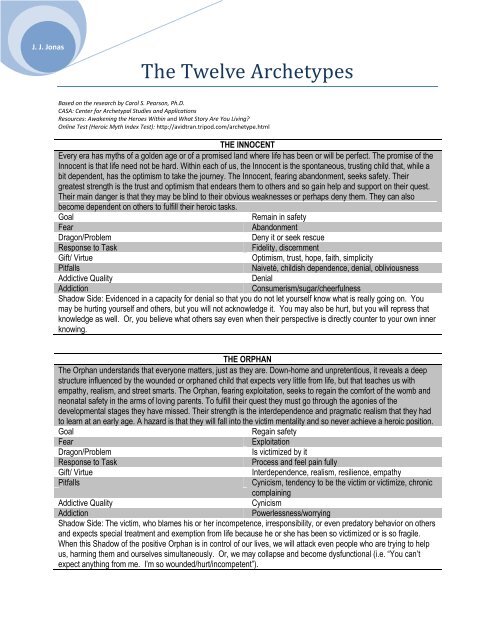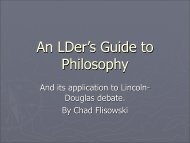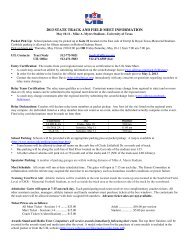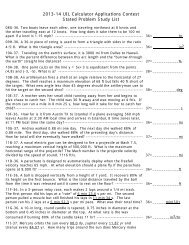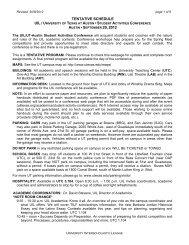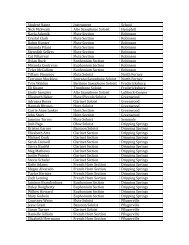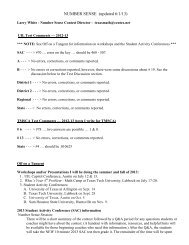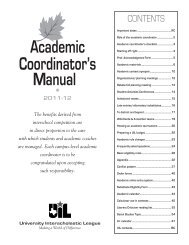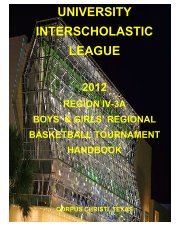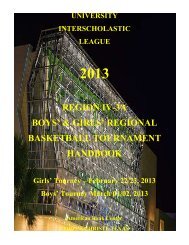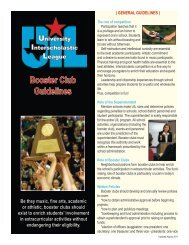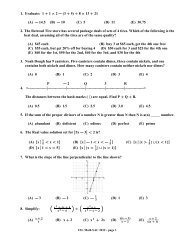The Twelve Archetypes
The Twelve Archetypes
The Twelve Archetypes
You also want an ePaper? Increase the reach of your titles
YUMPU automatically turns print PDFs into web optimized ePapers that Google loves.
J. J. Jonas<br />
<strong>The</strong> <strong>Twelve</strong> <strong>Archetypes</strong><br />
Based on the research by Carol S. Pearson, Ph.D.<br />
CASA: Center for Archetypal Studies and Applications<br />
Resources: Awakening the Heroes Within and What Story Are You Living?<br />
Online Test (Heroic Myth Index Test): http://avidtran.tripod.com/archetype.html<br />
THE INNOCENT<br />
Every era has myths of a golden age or of a promised land where life has been or will be perfect. <strong>The</strong> promise of the<br />
Innocent is that life need not be hard. Within each of us, the Innocent is the spontaneous, trusting child that, while a<br />
bit dependent, has the optimism to take the journey. <strong>The</strong> Innocent, fearing abandonment, seeks safety. <strong>The</strong>ir<br />
greatest strength is the trust and optimism that endears them to others and so gain help and support on their quest.<br />
<strong>The</strong>ir main danger is that they may be blind to their obvious weaknesses or perhaps deny them. <strong>The</strong>y can also<br />
become dependent on others to fulfill their heroic tasks.<br />
Goal<br />
Remain in safety<br />
Fear<br />
Abandonment<br />
Dragon/Problem<br />
Deny it or seek rescue<br />
Response to Task<br />
Fidelity, discernment<br />
Gift/ Virtue<br />
Optimism, trust, hope, faith, simplicity<br />
Pitfalls<br />
Naiveté, childish dependence, denial, obliviousness<br />
Addictive Quality<br />
Denial<br />
Addiction<br />
Consumerism/sugar/cheerfulness<br />
Shadow Side: Evidenced in a capacity for denial so that you do not let yourself know what is really going on. You<br />
may be hurting yourself and others, but you will not acknowledge it. You may also be hurt, but you will repress that<br />
knowledge as well. Or, you believe what others say even when their perspective is directly counter to your own inner<br />
knowing.<br />
THE ORPHAN<br />
<strong>The</strong> Orphan understands that everyone matters, just as they are. Down-home and unpretentious, it reveals a deep<br />
structure influenced by the wounded or orphaned child that expects very little from life, but that teaches us with<br />
empathy, realism, and street smarts. <strong>The</strong> Orphan, fearing exploitation, seeks to regain the comfort of the womb and<br />
neonatal safety in the arms of loving parents. To fulfill their quest they must go through the agonies of the<br />
developmental stages they have missed. <strong>The</strong>ir strength is the interdependence and pragmatic realism that they had<br />
to learn at an early age. A hazard is that they will fall into the victim mentality and so never achieve a heroic position.<br />
Goal<br />
Regain safety<br />
Fear<br />
Exploitation<br />
Dragon/Problem<br />
Is victimized by it<br />
Response to Task<br />
Process and feel pain fully<br />
Gift/ Virtue<br />
Interdependence, realism, resilience, empathy<br />
Pitfalls<br />
Cynicism, tendency to be the victim or victimize, chronic<br />
complaining<br />
Addictive Quality<br />
Cynicism<br />
Addiction<br />
Powerlessness/worrying<br />
Shadow Side: <strong>The</strong> victim, who blames his or her incompetence, irresponsibility, or even predatory behavior on others<br />
and expects special treatment and exemption from life because he or she has been so victimized or is so fragile.<br />
When this Shadow of the positive Orphan is in control of our lives, we will attack even people who are trying to help<br />
us, harming them and ourselves simultaneously. Or, we may collapse and become dysfunctional (i.e. “You can’t<br />
expect anything from me. I’m so wounded/hurt/incompetent”).
J. J. Jonas<br />
THE WARRIOR<br />
When everything seems lost the Warrior rides over the hill and saves the day. Tough and courageous, this archetype<br />
helps us set and achieve goals, overcome obstacles, and persist in difficult times, although it also tends to see others<br />
as enemies and to think in either/or terms. <strong>The</strong> Warrior is relatively simple in their thought patterns, seeking simply to<br />
win whatever confronts them, including the dragons that live inside the mind and their underlying fear of weakness.<br />
<strong>The</strong>ir challenge is to bring meaning to what they do, perhaps choosing their battles wisely, which they do using<br />
courage and the warrior's discipline.<br />
Goal<br />
Win<br />
Fear<br />
Weakness<br />
Dragon/Problem<br />
Stay/confront it<br />
Response to Task<br />
Fight only for what really matters<br />
Gift/ Virtue<br />
Courage, discipline, determination, skill<br />
Pitfalls<br />
Fear of impotence leading to ruthlessness, arrogance<br />
Addictive Quality<br />
Stoicism<br />
Addiction<br />
Achievement/success<br />
Shadow Side: <strong>The</strong> villain, who uses Warrior skills for personal gain without thought of morality, ethics, or the good of<br />
the whole group. It is also active in our lives any time we feel compelled to compromise our principles in order to<br />
compete, win, or get our own way. (For example, the shadow Warrior is rampant in the business world today.) It is<br />
also seen in a tendency to be continually embattled, so that one perceives virtually everything that happens as a<br />
slight, a threat, or a challenge to be confronted.<br />
THE CAREGIVER<br />
<strong>The</strong> Caregiver is an altruist, moved by compassion, generosity, and selflessness to help others. Although prone to<br />
martyrdom and enabling behaviors, the inner Caregiver helps us raise our children, aid those in need, and build<br />
structures to sustain life and health. Caregivers first seek to help others, which they do with compassion and<br />
generosity. A risk they take is that in their pursuit to help others they may end up being harmed themselves. <strong>The</strong>y<br />
dislike selfishness, especially in themselves, and fear what it might make them.<br />
Goal<br />
Help others<br />
Fear<br />
Selfishness<br />
Dragon/Problem<br />
Take care of it or those it harms<br />
Response to Task<br />
Give without maiming self or others<br />
Gift/ Virtue<br />
Compassion, generosity, nurturance, community<br />
Pitfalls<br />
Martyrdom, enabling others, codependence, guilt-tripping<br />
Addictive Quality<br />
Rescuing<br />
Addiction<br />
Caretaking/codependence<br />
Shadow Side: <strong>The</strong> suffering martyr, who controls others by making them feel guilty. “Look at all I sacrificed for you!”<br />
It evidences itself in all manipulative or devouring behaviors, in which the individual uses caretaking to control or<br />
smother others. It is also found in codependence, a compulsive need to take care of or rescue others.
J. J. Jonas<br />
THE SEEKER<br />
<strong>The</strong> Seeker leaves the known to discover and explore the unknown. This inner rugged individual braves loneliness<br />
and isolation to seek out new paths. Often oppositional, this iconoclastic archetype helps us discover our uniqueness,<br />
our perspectives, and our callings. Seekers are looking for something that will improve their life in some way, but in<br />
doing so may not realize that they have much already inside themselves. <strong>The</strong>y embrace learning and are ambitious<br />
in their quest and often avoid the encumbrance of support from others. Needing to 'do it themselves', they keep<br />
moving until they find their goal (and usually their true self too).<br />
Goal<br />
Search for better life<br />
Fear<br />
Conformity<br />
Dragon/Problem<br />
Flee from it<br />
Response to Task<br />
Be true to deeper self<br />
Gift/ Virtue<br />
Autonomy, ambition, identity, expanded possibilities<br />
Pitfalls<br />
Inability to commit, chronic disappointment, alienation,<br />
and loneliness<br />
Addictive Quality<br />
Self-centeredness<br />
Addiction<br />
Independence/perfection<br />
Shadow Side: <strong>The</strong> Perfectionist, always striving to measure up to an impossible goal or to find the “right” solution.<br />
We see this in people whose main life activity is self-improvement, going from the health club to yet another selfimprovement<br />
course, etc., yet who never feel ready to commit to accomplishing anything.<br />
THE LOVER<br />
<strong>The</strong> Lover archetype governs all kinds of love—from parental love, to friendship, to spiritual love—but we know it best<br />
in romance. Although it can bring all sorts of heartache and drama, it helps us experience pleasure, achieve intimacy,<br />
make commitments, and follow our bliss. <strong>The</strong> Lover seeks the bliss of true love and the syzygy of the divine couple.<br />
<strong>The</strong>y often show the passion that they seek in a relationship in their energy and commitment to gaining the reciprocal<br />
love of another. <strong>The</strong>y fear both being alone and losing the love that they have gained, driving them to constantly<br />
sustain their love relationships.<br />
Goal<br />
Bliss<br />
Fear<br />
Loss of love<br />
Dragon/Problem<br />
Love it<br />
Response to Task<br />
Follow your bliss<br />
Gift/ Virtue<br />
Passion, commitment, enthusiasm, sensual pleasure<br />
Pitfalls<br />
Objectifying others, romance/sex addictions, out of<br />
control sexuality<br />
Addictive Quality<br />
Intimacy problems<br />
Addiction<br />
Relationships/sex<br />
Shadow Side: Includes the sirens (luring others from their quests), seducers (using love for conquest), sex or<br />
relationship addicts (feeling addicted to love), and anyone who is unable to say no when passion descends, or is<br />
totally destroyed when a lover leaves.
J. J. Jonas<br />
THE DESTROYER<br />
<strong>The</strong> Destroyer embodies repressed rage about structures that no longer serve life even when these structures still<br />
are supported by society or by our conscious choices. Although this archetype can be ruthless, it weeds the garden<br />
in ways that allow for new growth. <strong>The</strong> Destroyer is a paradoxical character whose destructiveness reflects the<br />
death drive and an inner fear of annihilation. As a fighter, they are thus careless of their own safety and may put<br />
others in danger too. <strong>The</strong>ir quest is to change, to let go of their anger or whatever force drives them and return to<br />
balance, finding the life drive that will sustain them. Living on the cusp of life and death, they are often surprisingly<br />
humble.<br />
Goal<br />
Metamorphosis<br />
Fear<br />
Annihilation<br />
Dragon/Problem<br />
Allow dragon to slay it<br />
Response to Task<br />
Let go<br />
Gift/ Virtue<br />
Humility, metamorphosis, revolution, capacity to let go<br />
Pitfalls<br />
Doing harm to self/others, out of control anger, terrorist<br />
tactics<br />
Addictive Quality<br />
Self-destructiveness<br />
Addiction<br />
Suicide/self-destructive habits<br />
Shadow Side: Includes all self-destructive behaviors—addictions, compulsions, or activities that undermine intimacy,<br />
career success, or self-esteem—and all behaviors—such as emotional or physical abuse, murder, rape—that have<br />
destructive effects on others.<br />
THE CREATOR<br />
<strong>The</strong> Creator archetype fosters all imaginative endeavors, from the highest art to the smallest innovation in lifestyle<br />
or work. Adverse to stasis, it can cause us to overload our lives with constant new projects; yet, properly channeled,<br />
it helps us express ourselves in beautiful ways. Creators, fearing that all is an illusion, seek to prove reality outside<br />
of their minds. A critical part of their quest is in finding and accepting themselves, discovering their true identity in<br />
relation to the external world.<br />
Goal<br />
Identity<br />
Fear<br />
Inauthenticity<br />
Dragon/Problem<br />
Claims it as part of the self<br />
Response to Task<br />
Self-creation, self-acceptance<br />
Gift/ Virtue<br />
Creativity, vision, individuality, aesthetics, imagination,<br />
skill, vocation<br />
Pitfalls<br />
Self-indulgence, poverty, creating messes, prima-donna<br />
behaviors<br />
Addictive Quality<br />
Obsessiveness<br />
Addiction<br />
Work/creativity<br />
Shadow Side: Shows itself to be obsessive, creating so that so many possibilities are being imagined that none can<br />
be acted upon fully. (You might remember a film called <strong>The</strong> Pumpkin Eater, in which a woman got pregnant every<br />
time she was face-to-face with the vacuousness of her life. So, too, we can fill our emptiness with yet another<br />
inessential project, challenge, or new thing to do, as she filled herself with another baby. One variety of this is<br />
workaholism, in which we can always think of just one more thing to do.
J. J. Jonas<br />
THE RULER<br />
<strong>The</strong> Ruler archetype inspires us to take responsibility for our own lives, in our fields of endeavor, and in the society<br />
at large. If he/she overcomes the temptation to dominate others, the developed Ruler creates environments that<br />
invite in the gifts and perspectives of all concerned. <strong>The</strong> Ruler's quest is to create order and structure and hence an<br />
effective society in which the subjects of the Ruler can live productive and relatively happy lives. This is not<br />
necessarily an easy task, as order and chaos are not far apart, and the Ruler has to commit him or herself fully to<br />
the task. <strong>The</strong> buck stops with them and they must thus be wholly responsible -- for which they need ultimate<br />
authority.<br />
Goal<br />
Order<br />
Fear<br />
Chaos<br />
Dragon/Problem<br />
Find its constructive uses<br />
Response to Task<br />
Take full responsibility for your life<br />
Gift/ Virtue<br />
Responsibility, control, sovereignty, system savvy<br />
Pitfalls<br />
Rigidity, controlling behaviors, attitude of entitlement,<br />
elitism<br />
Addictive Quality<br />
High control needs<br />
Addiction<br />
Control/codependence<br />
Shadow Side: <strong>The</strong> ogre tyrant, insisting on his or her own way and banishing creative elements of the kingdom (or<br />
the psyche) to gain control at any price. This is the King or Queen who indulges in self-righteous rages and yells,<br />
“Off with his head.” Often people act this way when they are in positions of authority (like parenting) but do not yet<br />
know how to handle the attendant responsibility. This also includes people who are motivated by a strong sense to<br />
control.<br />
THE MAGICIAN<br />
<strong>The</strong> Magician archetype searches out the fundamental laws of science and/or metaphysics to understand how to<br />
transform situations, influence people, and make visions into realities. If the Magician can overcome the temptation<br />
to use power manipulatively, it galvanizes energies for good. <strong>The</strong> Magician's quest is not to 'do magic' but to<br />
transform or change something or someone in some way. <strong>The</strong> Magician has significant power and as such may be<br />
feared. <strong>The</strong>y may also fear themselves and their potential to do harm. Perhaps their ultimate goal is to transform<br />
themselves, achieving a higher plane of existence.<br />
Goal<br />
Transformation<br />
Fear<br />
Evil sorcery<br />
Dragon/Problem<br />
Transform it<br />
Response to Task<br />
Align self with cosmos<br />
Gift/ Virtue<br />
Personal power, transformative, catalytic, healing power<br />
Pitfalls<br />
Manipulation of others, disconnection with reality,<br />
cultist guru-like<br />
Addictive Quality<br />
Dishonesty (image/illusion)<br />
Addiction<br />
Power/hallucinogenic drugs, marijuana<br />
Shadow Side: <strong>The</strong> evil sorcerer, transforming better into lesser options. We engage in such evil sorcery anytime we<br />
belittle ourselves or another, or lessen options and possibilities, resulting in diminished self-esteem. <strong>The</strong> shadow<br />
Magician is also the part of us capable of making ourselves and others ill through negative thoughts and actions.
J. J. Jonas<br />
THE SAGE<br />
<strong>The</strong> Sage archetype seeks the truths that will set us free. Especially if the Sage overcomes the temptation of<br />
dogma, it can help us become wise, to see the world and ourselves objectively, and to course-correct based on<br />
objective analyses of the results of our actions and choices. <strong>The</strong> Sage is a seeker after truth and enlightenment and<br />
journeys far in search of the next golden nugget of knowledge. <strong>The</strong> danger for the sage and their deep fear is that<br />
their hard-won wisdom is built on the sand of falsehood. <strong>The</strong>ir best hope is that they play from a position of<br />
objective honesty and learn to see with a clarity that knows truth and untruth.<br />
Goal<br />
Truth<br />
Fear<br />
Deception<br />
Dragon/Problem<br />
Transcend it<br />
Response to Task<br />
Attain enlightenment<br />
Gift/ Virtue<br />
Wisdom, nonattachment, knowledge, skepticism<br />
Pitfalls<br />
Being overly critical, pomposity, impracticality, lacking of<br />
feeling/empathy<br />
Addictive Quality<br />
Judgmentalism<br />
Addiction<br />
Being right/tranquilizers<br />
Shadow Side: <strong>The</strong> unfeeling judge—cold, rational, heartless, dogmatic, often pompous—evaluating us or others and<br />
saying we (or they) are not good enough or are not doing it right.<br />
THE FOOL OR JESTER<br />
<strong>The</strong> Fool/Jester archetype urges us to enjoy the process of our lives. Although the Fool/Jester can be prone to<br />
laziness and dissipation, the positive Fool/Jester invites us all out to play--showing us how to turn our work, our<br />
interactions with others, and even the most mundane tasks into FUN. <strong>The</strong> goal of the Fool/Jester is perhaps the<br />
wisest goal of all, which is just to enjoy life as it is, with all its paradoxes and dilemmas. What causes most dread in<br />
the Fool/Jester is a lack of stimulation and being 'not alive'. <strong>The</strong>y must seek to 'be', perhaps as the Sage, but may<br />
not understand this.<br />
Goal<br />
Enjoyment<br />
Fear<br />
Nonaliveness<br />
Dragon/Problem<br />
Play tricks on it<br />
Response to Task<br />
Trust in the process<br />
Gift/ Virtue<br />
Freedom, humor, life lived in the moment, exuberant joy<br />
Pitfalls<br />
Debauchery, irresponsibility, sloth, cruel jokes, conartistry<br />
Addictive Quality<br />
Inebriation<br />
Addiction<br />
Excitement/cocaine/alcohol<br />
Shadow Side: A glutton, sloth, or lecher wholly defined by the lusts and urges of the body without any sense of<br />
dignity or self-control.


